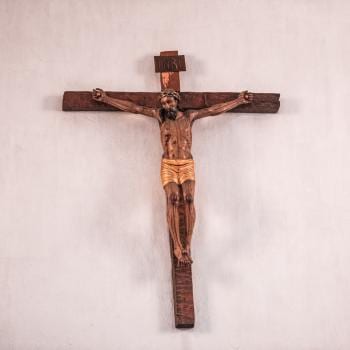And Achan answered Joshua, “Truly I have sinned against the LORD God of Israel, and this is what I did: when I saw among the spoil a beautiful cloak from Shinar, and 200 shekels of silver, and a bar of gold weighing 50 shekels, then I coveted them and took them. And see, they are hidden in the earth inside my tent, with the silver underneath.” – Joshua 7:20-21
I’ve often wondered how many of the people of Israel slept through Moses’ excessively long sermon of Deuteronomy. It would have been hard to attend all the way through. Still, the length, the pleading tone, the clear admonishments do make some kind of impression. The people cry out as one that they will obey, they will do all the things that God has commanded them to do. A long, forty year embattlement against the poverty of the desert, the difficulty of having to trust God for the surviving of each day, they gather it all up and decide they are definitely going to be good.
And then they go into the Land, their feet stepping over on dry ground, out of the desert and into the place of plenty.
These two verses, indeed the whole account of Achan, always land on my mind like a thud after all the goodness of the previous chapters–the cold stone of the reality of human sin, wrecking everything. It always happens. There always has to be a reaching out and grabbing. The Fruit in the Garden, the Golden Calf, the Censer full of strange fire, Bathsheba, the Old Testament list would take hours to compile, all the way through to the obvious New Testament hearkening note of Ananias and Saphira. What is surprising about each incident, but Achan more than any of them, is how little is traded away. A gold bar, some silver coins, a beautiful cloak, this he couldn’t resist. His whole life, all the waiting to come to this place, to be given everything, and then to trade it away for nothing, a cloak, a handful of coins.
It is so utterly tragic particularly because it is the condition, the character of practically every human sin. What does a person gain by reaching out and grabbing, by taking or doing what is forbidden? The thing, whatever it is, grows up into a great, golden ideal of perfect satisfaction. If I just have that, or do that, I’ll be happy, I’ll be better, I’ll be ok. Anybody looking in from the outside can see what a poor trade it is. But to you, reaching out, desperately wanting, the heavy cloud of poverty and rebellion makes it impossible to see how tragically you’re being duped.
But, embedded in this very moment of tragedy, is the perfection of hope. Achan confesses his sins. He admits to his sin and admits that it is a sin against God. This is the only way out. There isn’t any other way out of sin. It can’t be psychologized away, it can’t be ignored, it can’t be given an excuse, it has to be repented of. You have to admit that you’ve done it, that you’re wrong, and be sorry. This moment of true repentance always makes me believe that Achan himself is this moment in the bosom of Abraham. He suffers the terrible consequences of sin, he is executed for his crime, he feels the just wrath of God on his very person, but God promises, through the totality of scripture, that if you repent of your sins and cry out to him for mercy, he will confer the merits and benefits of Jesus’ death and resurrection on to you that your soul and body may be saved. For your handful of nothing, God endures the immensity of human sin, so that you can be forgiven.
The cloak, the bar of gold, the measly bundle of silver coins isn’t worth it. But to turn and cry out to Jesus, to be saved from yourself–that reaching out, that grabbing at hope is always and forever worthy.










